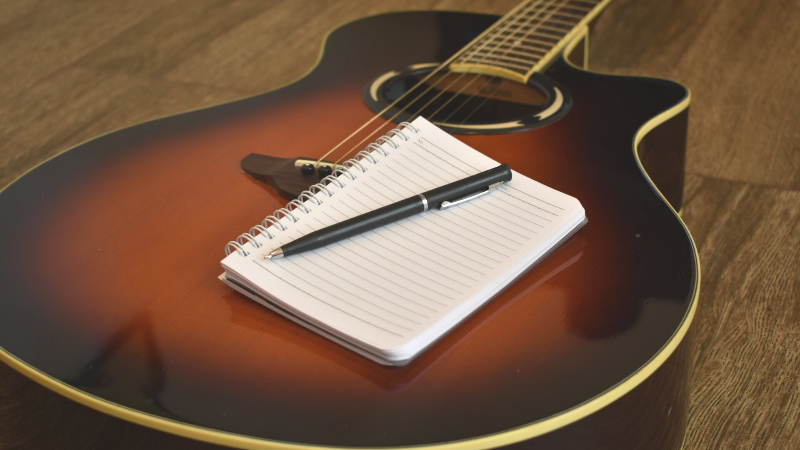
If you would like to get started writing songs than I want to be as much as a help to you as possible. For me writing songs has been the absolute backbone of the entirety of my life. Along the way I picked up more than a few tips to improve songwriting, we can share a few.
When I was a kid my mother put me into piano lessons. That was nice but I was such an introspective person it was always annoying for me to pull myself into the reality of others. That is still true today.
I still don’t care who hears what I write or what anyone thinks about anything. I just care about scratching the itch. If you have that itch in that way then perhaps you’ll know what I mean.
Of course there have been times to showcase songs and performances over the years. These days the motivators have changed. But the innate desire to write music remains constant.
So if any of that sounds familiar, then let’s see if this can be of some assistance to you. I suppose firstly we have to resolve what the motivations to write may be.
Whatever the motivation the most important thing is always getting started. So let’s get to that. We will discuss a number of things that will be beneficial to you no matter where you are coming from.
Step One: Acquaint Yourself With An Accompaniment Instrument
In order to get started, one of the first things you need to do is find an instrument. From there you’ll need to learn a little bit about it. These will be your accompaniment tools. If you hear melodies in your imagination then having some basic knowledge of the instrument will be a big help.
If you do have some skills, try making an effort on another way. Try picking up another instrument. That way If you run into some sort of writers block on one, you can grab the other.
Step Two: Find A Comfortable Place To Regularly Write
Once you have that worked out for your self. Find a place where you’ll be comfortable to work out any ideas you’ve come up with. Find a comfortable workspace. Then making it a part of your routine. This will demonstrate to your subconscious that should you arrive again to this spot… you’ll have an expectation.
Prepare your tea, have your coffee, you could even light a candle if it helps.
There is an expression which talks about dressing for success and in that way this is the same thing. Keeping a routine, and place to write will teach you to get to the doing. As that all becomes a habit, then you going to that place will mean it’s the time to get to the doing.
Step Three: Always Carry A Journal And A Voice Recorder
You should always carry some sort of notepad or recording device. For a lot of people their notebook has the same sort sentiment of a favorite writing nook.
Some of us are working multiple jobs. We may even be a bit overwhelmed with any number of challenges. So, the ability to quickly switch gears for songwriting is important.
If you are familiar with “Mr. Rodgers“, I can use him to demonstrate the idea. Think of how he came and changed from his suit jacket into his button up sweater.
In doing so he regularly demonstrated to his audience that the time for outside problems was over. Him putting on his in house sweater meant we were transitioning into the world of make believe.
The World Of Make Believe
That is exactly what a writer needs to do. So find the visual cues that help you get into the writing mode as quickly as possible. i
These days we all have a cellular phone, notepad or computer that have easy recording capabilities. In fact this age we live in has to be the best knowable age for those of us who write music
We can do things that were not financially possible just a short time ago. That said having a good note pad to scribble down ideas and to write out lyrics, Is a great idea. Then grab something to give yourself a reference recording and you’re set.
Step Four: Keep A Regular Songwriting Schedule
Try to allow your self a regular schedule to work on your music. It could be something that you look forward to throughout the week.
If you have the time to spend at it daily that would me the most ideal. But, if you cant afford that kind of regularity then create a schedule that works for you.
The important thing is allowing yourself to take this time seriously. Keeping a schedule and spending some time regularly working on your craft will help you to improve.
As I mentioned the routine will help to quickly induce your way back into the process of writing. Try keeping the schedule and watch what comes of these tips to improve your songwriting.
Step Five: Create A Songwriting Challenge For Yourself
From time to time it’s important to give yourself motivations. One way of doing that is by introducing some challenges. For instance you could make it your goal to write one new song a week. Or make it a goal to write one a day for a week. You could choose a theme or a number of themes. Then work to writing a song to fit each.
These songs may not be to the level that you aspire to. But, by doing your best to meet the various objectives you’ll have given your self quite a bit of insight into what really goes in to writing. Trying to meet a specific demand and being confined by the boundary of time limit to do so will teach you.
Think of it as something like stretching. Afterwards you can use any of those songs that have valuable parts and reorganize them into usable starters.
The fact is this whole thing is usually a one-person show. So you owe it to yourself to push your limitations and widen your boundaries. You’re the only one you have to rely on to get yourself to do so, so don’t disappoint. These types of challenges will keep you interested and engaged. They will teach you things about writing that you’d otherwise never discover.
Step Six: Write About What You Know
Songs are an expression of the things we live through. So it’s ok to tell your stories. You needn’t feel inadequate in doing so.
You, as a living person have experienced and will experience a wide array of ups and downs. This will include both successes and failures. So don’t be shy about telling us about the world in your voice. Your listeners will be able to relate some how.
Dialing some emotional experience into your song can give it lift. So it’s very important to do your best and write honestly.
If you are only trying to imitate another artist it may just come over as contrived. Its better to learn how to use your energy to empower your own voice. So celebrate your own story and find the passion to convey your intentions as thoughtfully as you can.
Step Seven: Write With Other People
A really great way to progress is to work together with some other writers. Perhaps there is a songwriter’s meet-up in your community. By joining you can get to know others in the same boat.
Regardless of how you network, once you have make a plan to get together and get to work.
Right off the bat you’ll have the immediate benefit of having an extra set of ears on your material. They’ll have the same benefit, having you listen to what they’ve been working on.
Eventually, if it suits the both of you, choose one piece to start working on together. With a little bit of time you’ll slowly build a report together. That report could come to be an invaluable asset for the both of you. Each with a trustworthy resource for critical feedback.
Having that input can help you make the adjustments that you need to hone your craft. Additionally, It can be advantages to take account of another person’s songwriting process.
Just the consideration of how another person thinks about songwriting could give you some tips to improve your songwriting. Those takeaways could lead to you picking up new skills to incorporate into your own repertoire.
Step Eight: Play The Songs, Then Revise

There is so much revision that can be found by taking the song to public. I highly recommend involving yourself in an open mic night. It may be intimidating at first but really never mind that. Focus on the benefit and plow through.
You can take your song, play it against a friendly audience and decide for yourself exactly how it went over. Pay attention to whether the various parts connect with the audience they way you’d expected. Try to understand why they did or didn’t.
Later when you’ve had time to decompress, you can decide to make adjustments or not. If you do decide to make some changes, don’t forget to take them back to the open mic.
You may even get some direct feedback about the changes you’ve made. Some of the other participants who heard the debut may have some tips to improve your songwriting, as well as thoughts about your song changes.
By going to the open mic, you may take away inspiration from something you hear from the other performers. So don’t miss out on all of this, it really is a fantastic resource.
Step Nine: Practice Your Instruments And Try New Techniques
Using all of these tips to improve songwriting and doing that well is a long game. You will continually be confronted with opportunities to add tools to your toolbox. Challenges will arise and they will require that you find an pathway through.
You will derive a greater depth of perspective from each challenge. Because you won’t always want to manage your effort in a reactive state. You would be better to be “positioned” and if you can be, it would be in your interest to be proactive.
Should you add to your repertoire some specific technique and that technique can be woven into whatever it is that you are creating next, then good on you.
The aspect of the songwriter and that of the musician can be used to leverage each other. Use your desire to improve your songwriting prowess to initiate and progress your musicianship. Whatever those yields allow can be incorporated back into your next songwriting composition.
Step Ten: Study And Scrutinize The Work Of Other Artists
Long after you have established your own capacity for composition and once you are certain that you are not merely going to imitate others, it can be very beneficial to dissect and consider the work of other songwriters.
You could consider why things work for the song and what about it is appealing. You could also consider what is it in those songs that create tension. Then reflect on how both of those features are employed to communicate a feeling and story.
Additionally make note of the arrangements and catalog that away for yourself as a resource. As you advance you can also make note of instrumentation and how it is used to effect. Whether it is grandiose or it is minimalistic.
Doing all of this is really just a matter of being a sponge and soaking up as much information as you can. Eventually you’ll come to some sort of tipping and point. All of that moment will help you to finally get what you’ve wanted from all of the effort.
Step Eleven: Record Your Songs As You Write
Start step eleven by recognizing all of the the fun that came with mastering all of these tips to improve songwriting. Once you have built a lot of skills and a catalogue of songs its time to think about recording. To that you’ll need to look into downloading some recording software to your computer.
In addition to these programs being a basic tool for recording your songs. They can also be a great tool for the songwriting process. Within the recording software are tools with which you can copy, cut and paste.
It can be very helpful for making decisions about song structure and arrangements. You can also put a few measures of instrumentation on loop so you can play with the arrangement. The computer gives you the potential to A/B ideas.
This can be a very helpful exercise for refining your ear. You’ll build confidence finding resolutions to any any number of songwriting decisions.
When you finally are ready to compile some of those songs into an album, we have some help. Here is a great article about making an EP. I’m sure it will give you some insight and motivation. Have a read!
In Conclusion
The most important thing about doing anything is getting started. Hopefully these thoughts are in some small way helpful to you. After many years of following this path for myself I can honestly say that I can’t imagine having spent my time any other way. I hope that you can find yourself that same kind of value.
Remember, this is a long game. And, while being hard on yourself can have a value you certainly needn’t be that way all the time. Additionally don’t expect too much too fast and you’ll likely not disappoint yourself too much. The joy of doing all this is one that comes the little by little. So take all of these tips to improve songwriting and go and get to it.
Good Luck!
